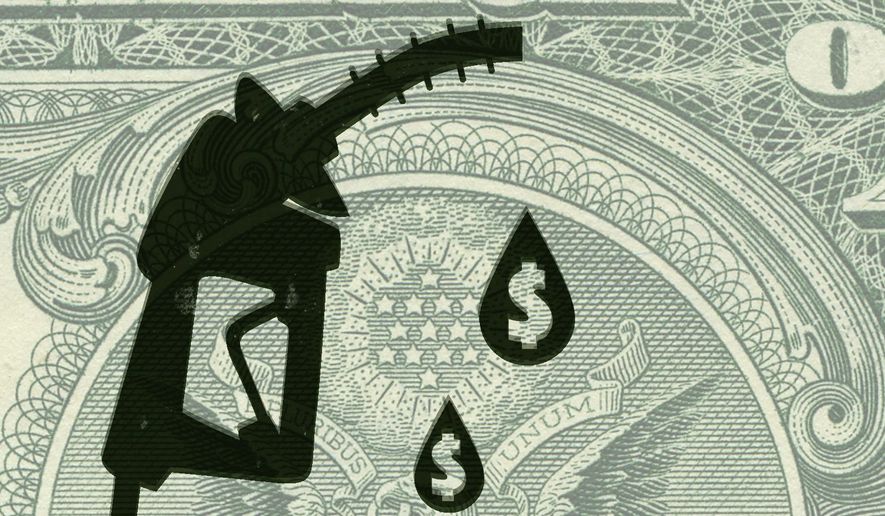OPINION:
The economy needs a jolt to keep growing. President Trump and Democrats should put aside differences to boost infrastructure investment and modernize cities and rural technology.
The economy is adding jobs at a slowing pace, and cutting interest rates won’t do much to accelerate investment, because businesses are pixilated about the outcome of the trade war — new opportunities in China vs. stalemate and diversion of supply-chains to Mexico and Asia.
More tax cuts to encourage consumer spending would add to the deficit, imports and foreign borrowing but do little to build a more competitive America. Roads, bridges and ports are straining to handle commuters and move goods, and the U.S. Internet is in danger of falling behind the Chinese.
Democrats and Mr. Trump can argue the causes of climate change, but no one looking at the recent severity of storms can doubt our coastal metropolises need hardening. Rural telecom carriers need assistance to wean from Huawei and ZTE equipment and build out 5G.
Federal and state governments spend about $450 billion a year or roads, bridges, mass transit, waterways and the like. That should be increased by at least $200 billion to catch decaying and crowded facilities and address climate change abatement and 5G.
Inadequate facilities are imposing economic losses of at least $400 billion a year and more than 1 million jobs — more than what is needed in additional spending on repairs and upgrades.
U.S. fatalities per mile driven are about 40 percent greater than those in Canada and double those in Sweden, which is viewed as having the safest roads in the world.
Federal agencies like the Army Corps of Engineers, and state and local governments have backlogs of projects. The trick is not to tie them up with federal approvals or let environmental groups impede progress through the courts.
Washington is inclined to micromanage by allocating money to specific purposes, playing into the hands of bureaucrats, empire builders and activists — who universally delay worthy investments to justify their existence.
To give the economy a quick boost and do good for the long run, it would be better to simply appropriate an additional $200 billion annually in proportion to present allocations among states and agencies. Don’t earmark projects but instead require that the funds be spent within the year received — and audit projects for integrity in bidding and the like. Then, funds for projects held up by the courts would be diverted to other worthy purposes.
All of this boils down to how to pay.
Last raised in 1993, the gas tax is 18.3 cents per gallon and is supplemented by a 24.3 cents diesel tax — those provide about $40 billion of the nearly $60 billon the Federal Highway Trust Fund spends, with Congress providing supplemental money from other sources. About 28 percent of the fuel taxes are diverted to mass transit, bike paths and other noble purposes.
After years of inflation and with oil prices so low, doubling those taxes, requiring higher transit fees and excise taxes on bicycles, tires and recreational equipment could add another $50 billion to what can be spent.
Sen. Chuck Schumer, whose will the president cannot ignore, won’t consider higher gas taxes without repealing some of the 2017 tax reductions for high-income households. Like it or not, that’s where another $50 billion has to be found.
The other $100 billion can be borrowed because the boost to GDP from $200 billion in spending on cement, bulldozers and Internet routers should be about $250 billion. That would generate a lot of taxes, so in the end the increase in the deficit would be much less than $100 billion.
Last spring, congressional Democrats endorsed a $2 trillion, multiyear package — roughly in line with the amount proposed here. President Trump initially agreed to look for a way forward but then said he would not negotiate on these issues while the congressional investigation into Russian influence continues.
The economy is at a genuine risk of recession — and that poses more of a threat to the president’s re-election than the machinations of Russia conspiracy zealots like Rep. Adam Schiff.
Mr. Trump would be well advised to advocate an immediate infrastructure package as necessary to avoid an economic downturn and unemployment, challenge Sen. Schumer and House Speaker Nancy Pelosi to cooperate and put the onus on them if the package is not passed and the economy tanks.
• Peter Morici is an economist and business professor at the University of Maryland, and a national columnist.




Please read our comment policy before commenting.